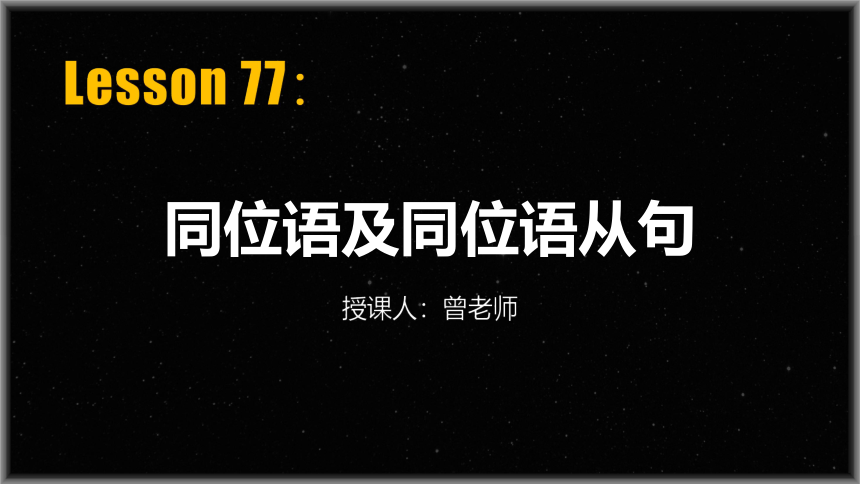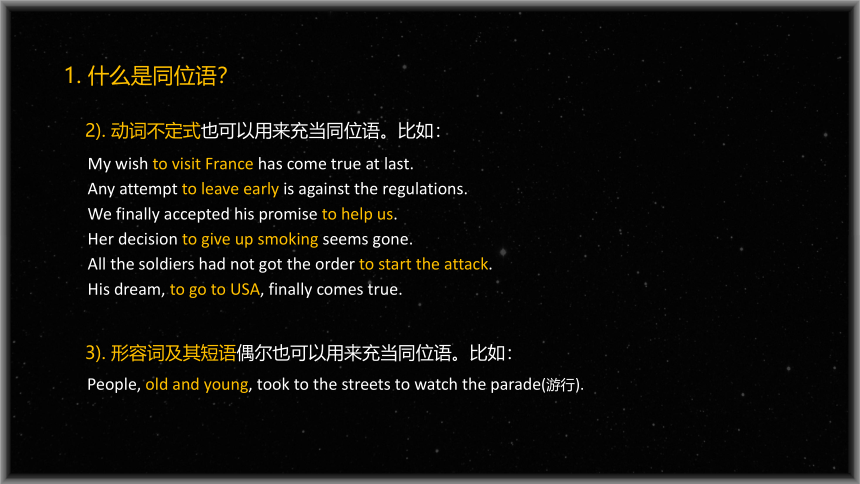L77-同位语及同位语从句 初中英语词性句法新讲课件
文档属性
| 名称 | L77-同位语及同位语从句 初中英语词性句法新讲课件 |  | |
| 格式 | ppt | ||
| 文件大小 | 903.0KB | ||
| 资源类型 | 试卷 | ||
| 版本资源 | 通用版 | ||
| 科目 | 英语 | ||
| 更新时间 | 2022-04-11 09:59:44 | ||
图片预览




文档简介
(共9张PPT)
同位语及同位语从句
Lesson 77:
授课人:曾老师
1. 什么是同位语?
1). 名称性词或短语充当同位语:
Mr. Smith, our new English teacher, is very kind to us.
Yesterday I met Tom, a friend of my brothers'.
Yesterday I talked to my English teacher, Mr. James.
He is interested in sports, especially ball games.
We both come from Hunan.
You three take these seats.
We Chinese people are brave and hard-working.
The old man met his best friend Henry at the station yesterday.
一个具有表述功能的词或短语对另一个名称性词进行解释或补充说明,就叫同位语。
1. 什么是同位语?
2). 动词不定式也可以用来充当同位语。比如:
My wish to visit France has come true at last.
Any attempt to leave early is against the regulations.
We finally accepted his promise to help us.
Her decision to give up smoking seems gone.
All the soldiers had not got the order to start the attack.
His dream, to go to USA, finally comes true.
3). 形容词及其短语偶尔也可以用来充当同位语。比如:
People, old and young, took to the streets to watch the parade(游行).
2. 什么是同位语从句?
一个句子用来充当同位语就叫同位语从句。
The girls were surprised at the fact that ocean ships can sail up the Great Lake.
I heard the news that our team had won.
I’ve come from Mr. Wang with a message that he won’t be able to see you this afternoon.
He must answer the question whether he agrees with it or not.
The idea that you can do this work well without thinking is quite wrong.
I have no idea what size shoes she wears.
一般来说,同位语从句常紧跟在被修饰说明的那个词或短语后面。比如:
2. 什么是同位语从句?
也有同位语从句与被修饰词分开的情况,比如:
The order soon came that all citizens should evacuate(撤离) the village.
The thought came to him that maybe the enemy had fled the city.
3. 同位语从句与定语从句的区别:
定语从句对它所修饰的词起限定作用,其引导标签词在从句中肯定要充当某个成分。
比如:
The news that you told me was really exciting.
I will never forget the day when I joined the army.
This is the house where I lived two years ago.
This’s the reason why she won’t attend the meeting.
“that”在从句中充当宾语
“when”当状语,相当于“on that day”
“where”当状语,相当于“in this house”
“why”相当于“because of this reason”
3. 同位语从句与定语从句的区别:
而同位语从句对它所修饰的词起补充说明作用,引导标签词在从句中不充当任何成分。
而且这个同位语从句可以等同于被它补充说明的名称词。比如:
We heard the news that our team had won.
等同于:We heard the news, and the news was that our team had won.
We have no idea when she was born.
等同于:We have no idea, and the idea was when she was born.
3. 同位语从句与定语从句的区别:
试对比以下例句:
The news that you told me yesterday was really exciting.
We heard the news that our team had won.
I will never forget the day when I joined the army.
We have no idea when she was born.
定语从句
同位语从句
This is the house where I lived two years ago.
He put forward to the question where the meeting would be held.
定语从句
同位语从句
This is the reason why she will not attend the meeting.
The teacher had no idea why Jack was absent.
定语从句
同位语从句
定语从句
同位语从句
3. 同位语从句与定语从句的区别:
例题练习:
【考例1】 Some researchers believe that there is no doubt a cure for AIDS will be found.
A. which B. that C. what D. whether
【考例2】 A warm thought suddenly came to me I might use the pocket money to buy
some flowers for my mother's birthday.
A. if B. when C. that D. which
【考例3】 Nobody believed his reason for being absent from the class he had to meet his
uncle at the airport.
A. why B. that C. where D. because
√
√
√
同位语及同位语从句
Lesson 77:
授课人:曾老师
1. 什么是同位语?
1). 名称性词或短语充当同位语:
Mr. Smith, our new English teacher, is very kind to us.
Yesterday I met Tom, a friend of my brothers'.
Yesterday I talked to my English teacher, Mr. James.
He is interested in sports, especially ball games.
We both come from Hunan.
You three take these seats.
We Chinese people are brave and hard-working.
The old man met his best friend Henry at the station yesterday.
一个具有表述功能的词或短语对另一个名称性词进行解释或补充说明,就叫同位语。
1. 什么是同位语?
2). 动词不定式也可以用来充当同位语。比如:
My wish to visit France has come true at last.
Any attempt to leave early is against the regulations.
We finally accepted his promise to help us.
Her decision to give up smoking seems gone.
All the soldiers had not got the order to start the attack.
His dream, to go to USA, finally comes true.
3). 形容词及其短语偶尔也可以用来充当同位语。比如:
People, old and young, took to the streets to watch the parade(游行).
2. 什么是同位语从句?
一个句子用来充当同位语就叫同位语从句。
The girls were surprised at the fact that ocean ships can sail up the Great Lake.
I heard the news that our team had won.
I’ve come from Mr. Wang with a message that he won’t be able to see you this afternoon.
He must answer the question whether he agrees with it or not.
The idea that you can do this work well without thinking is quite wrong.
I have no idea what size shoes she wears.
一般来说,同位语从句常紧跟在被修饰说明的那个词或短语后面。比如:
2. 什么是同位语从句?
也有同位语从句与被修饰词分开的情况,比如:
The order soon came that all citizens should evacuate(撤离) the village.
The thought came to him that maybe the enemy had fled the city.
3. 同位语从句与定语从句的区别:
定语从句对它所修饰的词起限定作用,其引导标签词在从句中肯定要充当某个成分。
比如:
The news that you told me was really exciting.
I will never forget the day when I joined the army.
This is the house where I lived two years ago.
This’s the reason why she won’t attend the meeting.
“that”在从句中充当宾语
“when”当状语,相当于“on that day”
“where”当状语,相当于“in this house”
“why”相当于“because of this reason”
3. 同位语从句与定语从句的区别:
而同位语从句对它所修饰的词起补充说明作用,引导标签词在从句中不充当任何成分。
而且这个同位语从句可以等同于被它补充说明的名称词。比如:
We heard the news that our team had won.
等同于:We heard the news, and the news was that our team had won.
We have no idea when she was born.
等同于:We have no idea, and the idea was when she was born.
3. 同位语从句与定语从句的区别:
试对比以下例句:
The news that you told me yesterday was really exciting.
We heard the news that our team had won.
I will never forget the day when I joined the army.
We have no idea when she was born.
定语从句
同位语从句
This is the house where I lived two years ago.
He put forward to the question where the meeting would be held.
定语从句
同位语从句
This is the reason why she will not attend the meeting.
The teacher had no idea why Jack was absent.
定语从句
同位语从句
定语从句
同位语从句
3. 同位语从句与定语从句的区别:
例题练习:
【考例1】 Some researchers believe that there is no doubt a cure for AIDS will be found.
A. which B. that C. what D. whether
【考例2】 A warm thought suddenly came to me I might use the pocket money to buy
some flowers for my mother's birthday.
A. if B. when C. that D. which
【考例3】 Nobody believed his reason for being absent from the class he had to meet his
uncle at the airport.
A. why B. that C. where D. because
√
√
√
同课章节目录
- 词法
- 名词
- 动词和动词短语
- 动词语态
- 动词时态
- 助动词和情态动词
- 非谓语动词
- 冠词
- 代词
- 数词和量词
- 形容词副词及其比较等级
- 介词和介词短语
- 连词和感叹词
- 构词法
- 相似、相近词比较
- 句法
- 陈述句
- 一般疑问句和否定疑问句
- 特殊疑问句及选择疑问句
- 反意疑问句
- 存在句(There be句型)
- 宾语从句
- 定语从句
- 状语从句
- 主谓一致问题
- 简单句
- 并列句
- 复合句
- 主谓一致
- 主、表语从句
- 名词性从句
- 直接引语和间接引语
- 虚拟语气
- 感叹句
- 强调句
- 倒装句
- 祈使句
- 句子的成分
- 句子的分类
- 题型专区
- 单项选择部分
- 易错题
- 完形填空
- 阅读理解
- 词汇练习
- 听说训练
- 句型转换
- 补全对话
- 短文改错
- 翻译
- 书面表达
- 任务型阅读
- 语法填空
- 其他资料
